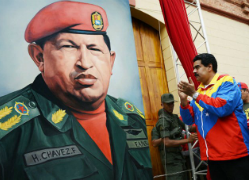
Venezuela’s controversial President Hugo Chávez died on March 5, 2013, after struggling with cancer since June 2011. As Venezuela prepares for the presidential election that is scheduled for April 14th, many wonder how Chávez’s death will impact Venezuela’s place in the international community. Chávez was a polarizing figure with enthusiastic supporters, and equally enthusiastic critics, both at home and abroad. The outcome of the April election will determine whether Chávez’s controversial policies will live on without him.
Chávez described his style of governance as 21st Century Socialism, and a common theme of Chávez-rhetoric involved condemnation of western capitalism. Other Latin American countries elected similar far-left leaders, who Chávez showed support by providing their countries with Venezuelan aid. The general socialist trajectory of many Latin American governments has been a reaction to unsuccessful neo-liberal policies from the past. However, the future of Chávez’s international social programs—such as the oil-for-doctors exchanges with Cuba—depends on who wins the presidential election in April.
Chávez’s popular domestic support is commonly attributed to the vast social programs enacted for the benefit of Venezuela’s poor. Chávez’s government created state run cooperatives, and established programs to improve literacy, health, and access to food. Chávez received support for several significant constitutional amendments which passed by popular vote and this support is commonly attributed to his social programs. During Chávez’s presidency, there was a “sharp drop” in economic inequality in Venezuela, as measured with the Gini index. Despite such positive indicators, the day-to-day experience for Venezuelans may not have been significantly improved. Programs have not always lived up to Chávez’s description: subsidized grocery stores have been plagued by shortages of basic goods “like milk, meat and toilet paper.”
Chávez’s treatment of Venezuela’s oil industry is a common topic of international criticism. Venezuela enjoys the largest reserves of crude oil in the world. Chávez’s socialist policies were costly, and Chávez needed oil profits to fund his welfare programs. In 2006, Chávez began nationalizing oil projects run by multinational oil companies in the oil-rich Cerro Negro area of the Orinoco Oil Belt. These nationalizations led to multiple cases of protracted international commercial arbitration brought before the ICSID and ICC by Conoco-Philips and Exxon-Mobil and others. After a series of challenges to nationalizations in various industries, Venezuela withdrew from the ICSID Convention to avoid being subjected to further ICSID arbitrations. The cases involving Exxon-Mobil produced significant hostility. Chávez defended his nationalization of the Cerro Negro project, saying Exxon had been stealing from Venezuela and “we won’t give in to imperialism.” Now the Venezuelan oil industry suffers from diminished production capabilities because of failure to reinvest profits in infrastructure and loss of technological advances after alienating foreign direct investment.
Chávez was perceived as a hero or a villain. Chávez’s presidency was criticized for media censorship and interference with the judiciary. The Human Rights Watch found that the Chávez regime filed criminal complaints against internationally funded NGOs, outspoken journalists and politicians. However, a variety of public figures embraced Chávez: Rev. Jesse Jackson celebrated Chávez in eulogy saying “Hugo fed the hungry. He lifted the poor. He raised their hopes. He helped them realize their dreams.”
Whether Chávez’s policies will be continued depends in large part on whether Nicolas Maduro—Chávez’s appointed political heir—or Henrique Capriles—the opposition leader—is elected in April. Henrique Capriles won 45% of the popular vote in the October elections; Capriles was closer to beating Chávez than any presidential candidate during Chávez’s presidency. If Capriles wins the election, he plans to replicate “Brazil’s ‘modern left’ model of economic and social policies.” Electing Capriles would foreshadow a more moderate political atmosphere in Venezuela. However, Capriles has an uphill battle. Chávez’s legacy has been left to acting president Maduro. Maduro has been involved in Chávez’s presidency from the beginning: Maduro helped draft the new constitution after Chávez first came to power in 1999. Since then, Maduro has been a congressman, foreign minister, and most recently, Vice President. Maduro’s union leader and bus driver background only makes him a more appealing candidate to Chávez supporters.
Katharine York is a second year law student at the University of Denver and a Staff Editor on the Denver Journal of International Law and Policy.

